Project directors
- John S. Bak, Université de Lorraine
- Lesley Cowling, University of the Witwatersrand
Project Members
- Kevin Davie, University of the Witwatersrand, lecturer
- Mfuneko Toyana, University of the Witwatersrand, postgraduate student
- Lesley Mofokeng, University of the Witwatersrand, doctoral student
- Aarti Bhana, University of the Witwatersrand, master's student
- Mélanie Joseph-Vilain, Université de Bourgogne, professor
- Gilles Teulié, Aix-Marseille Université, professor
- Indiana Lods, Université de Bourgogne, doctoral student
Project Partners with IDEA
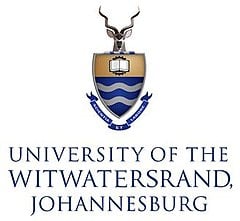
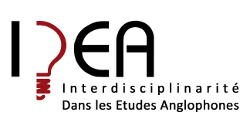
Project Sponsors
NRF (National Research Foundation in South Africa) and Partenariats Hubert Curien (PHC) PROTEA (Campus France) and the Ministère de l’Europe et des Affaires étrangères (MEAE) and the Ministère de l’Education nationale, de l'Enseignement supérieur et de la Recherche (MESRI).
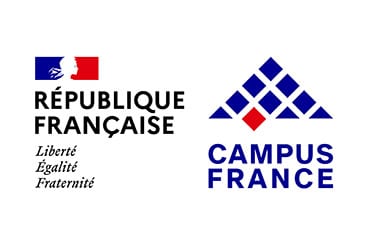

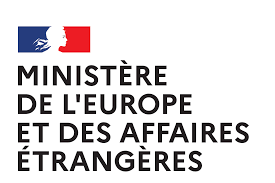
Description
JorLitSAF will focus on oral and textual narrative journalistic traditions in both South Africa and France around the time of the Second Boer War (year one) and post-apartheid (year two) periods. It will be triptych in structure, with elements tied to: 1) advancing scientific research on narrative literary journalism studies; 2) forming young scholars in both countries within a still emerging academic discipline; and 3) instructing the practical applications of oral and textual narrative journalism for students and nonstudents alike in the goal of helping them find their voice and recounting the true stories that have affected their lives and those around them. The use of the Boer War and post-apartheid as two specific periods of study are not intended to constrain individual and collective research, nor to be exhaustive in scope, but rather, given the brevity of this two-year project, to establish a temporal framework in which to limit our project’s purview and still create ample research opportunities for future scholars to explore.
In sum, then, we expect the following outputs over the two-year project period:
- 4 student theses/research reports on aspects of the project;
- 4 student presentations at the conference for the International Association for Literary Journalism Studies in 2023 and 2024, other work-in-progress presentations at a symposium at Wits Journalism in Johannesburg in October 2022 and 2023, and presentations at a Summer School hosted by the French partner institution, the Université de Lorraine, in May 2024;
- 2 articles from student work for journals such as Literary Journalism Studies, or Safundi;
- 4 presentations by researchers on preliminary findings at various European, American or South African media or comparative literature conferences;
- a number of longform journalism articles on the findings, such as an account by Leslie Mofokeng of Sol Plaatje's writing on the Siege of Mafeking, published in online media such as New Frame and the Daily Maverick;
- a book chapter by Lesley Cowling on the Drum writers in a proposed book on the black press, accepted by Wits University Press;
- book chapters or journal articles by the senior researchers drawn from the JorLitSAF research project.
Together, these short- and long-term benefits from scientific, pedagogical and professional writing advances will have impacts that will reverberate through both academic and professional fields alike for years to come.
-
Program 2022
-
The fin de siècle in both France and South Africa marked a sharp rise in the production of reportage/literary journalism writings, and the Boer War was one of the reasons behind it. Like the Crimean War before it and the Spanish Civil War after it, the First and Second Boer Wars drew the attention of the world press, since it was seen as a major test to colonialism. Wars provide a “perfect storm” for literary journalism, bringing together on one page all of the geopolitical intrigue, Gothic horror, nationalistic jingoism and humanistic empathy for its readers. It also allows scholars an opportune moment to compare nations’ print productions (internal and external to a country) to gauge a nation’s pulse during such fraught moments. A wide-ranging study of literary journalism’s production, migration, and mutation on the international level during the Boer War will preoccupy JorLitSAF’s first year.
Before any comparatist study can be carried out, a corpus will need to be established. While the project’s consortium will begin this task within the first few months of 2022, searching through the online and print archives for known and unknown Boer War reportages, a request for others’ perspectives on the topic will be made by asking French and South African scholars to join a symposium-style thinktank in June 2022 (WP1). The purpose of this thinktank will be to produce a larger corpus of French journalisme littéraire and South African reportage written around the time of the Boer War. This corpus will not only augment the international body of writing in the emerging field of Literary Journalism Studies but also provide the JorLitSAF consortium with the necessary texts and cultural framework to carryout out its comparatist work during a graduate symposium that will take place in Johannesburg in October 2022 (WP2).
Once a clearer understanding of the amount and the types of European reportage and literary journalism that were written about the Boer War is established, the next task requires a formal comparatist study of those text (WP2). Working from the texts amassed in WP1, this task will take the form of a Graduate/Doctoriale workshop. The aim of this workshop will be to establish more clearly how the media transformed in South Africa and where it migrated once it took hold in the nation. Given South Africa’s colonialist links with Great Britain, one sure passage was through the English press, so a closer look at the Victorian discourse evident in England’s “new journalism” will be undertaken to examine its impact on South African reportage. But another question worth addressing is whether the South African presses took to the literary experiments of France’s fin de siècle journalists as well. It is well known that French Republicanism inspired many colonized nations (save France’s own) looking to reject the ideologies of its colonizer, and, following the Paris Exposition of 1889, France was surely enjoying a certain amount of global cache. Given South Africa’s complex and heterogenous population at the turn of the century, would it have looked, consciously or not, to a neutral nation guidance? And was not the press the most accessible means of such cultural mediation? For example, French journalisme littéraire and England’s “new” journalism both passed through Canada and Quebec, and scholars there have been looking into when and where Canadian literary journalism developed its unique identity. Such theorization could also be applied to the influx of British and Dutch literary journalism into South Africa, to see if there was a similar approach in South Africa to reject its colonizer by precisely looking to another potential source (French literary journalism). The Graduate Student/Doctoriale workshop will not only produce scholarship which could be collected in a special issue of Literary Journalism Studies but also help train a new generation of scholars in the field.
The first year of the project, then, will be devoted to WP1 and WP2, in short, studying the influx of literary journalism throughout South Africa during the Boer War, exploring its transnational circulation, and looking at what point a French journalisme littéraire impacted that narrative flow. Tracing the development of the form in South Africa over the next century is beyond the scope of this brief, two-year project – research on the interim years will be left to future scholars, perhaps even those being trained through this collaborative project. Instead, for its second year, JorLitSAF will proceed directly to contemporary literary journalistic issues in the country’s post-apartheid landscape. The literature review above has established that one of the most burning issues today in South African letters is the question of fiction versus nonfiction. In a country rich in oral cultures as South Africa is – one of the direct results of apartheid and its separatist measures to ensure illiteracy among the black population – much scholarship has already been devoted to the power that orality has over the written word. Moreover, oral culture has been at the heart of reconciliation, where the true stories of peoples’ fates in South Africa have become as powerful, if not more powerful, than the fictional stories novelists can create. Since immersion reporting and eyewitness accounts are key elements of literary journalism, South Africa has become one of the most prolific nations today in narrative nonfiction, a point not lost on France, which is equally seeing a return to the genre it once celebrated a century ago. The project’s second year, then, will be dedicated strictly to the Franco-South African ties to this fiction/nonfiction debate, first in their separate national discourses on the topic, and next in a transnational perspective.
Protea JorLitSAF Online meeting
25 February 2022
While John Bak and Lesley Cowling have been meeting online for about a year now, and he and she and Kevin all met back in December right after they had received news of having been awarded the grant, this meeting was the first one where nearly all the French and South African colleagues met for the first time.
Since January 2022, on the French side, John has been searching within various scholarly sites (MLA International Bibliography, Jstor, etc.) for academic articles and open access books that deal with literary journalism, the French press in the 19th century, and the Boer Wars, from both a European and a South African perspective. He sent all of these resources (about 75 books and articles) via We Transfer to the whole consortium so that they all had a common corpus of secondary scholarship to work from. The group decided it would be a good idea to create a Drop Box account where everyone could continually upload scholarship they find so that everyone else has access to it.
During this 25 February meeting of 90 minutes via Zoom, everyone introduced themselves and spoke about their current research project and its connection to the larger JorLitSAF project. They discussed how the saw, during this first year on the Boer War and literary journalism, their individual projects dovetailing with each others’ work. It was agreed that, while some of the research produced during the two-year project would be collaborative, another facet of the project would be the sharing of individual research that would eventual cross paths with someone else’s research later on.
The team then discussed their June 2022 thinktank, in terms of the definitive dates (the week of the 11-18 June). Everyone would bring copies of their primary sources collected since January, from South African diaries about the Boer War to over 500 press articles gleaned from the French press in Paris but also the Francophone press in Madagascar and La Réunion (on Gallica of the Bibliotèque Nationale in France). Each of these sources will be looked and discussed in June with the goal of locating a common trend of proto-literary journalism writing in them that no doubt has connections to the colonial/imperialist discourse coming out of Europe, to the antagonistic discourse of the French towards the British and in support of the boers (whose Protestantism independence drew the French Huguenots to live alongside the boers), the South African diaries written at the time by Olive Schreiner and Sol Plaatje, and to the technological advances taking place at the fin de siècle which would have influenced a literary journalistic style of writing (e.g., telegraph, which influenced the proliferation of foreign war correspondents). From this workshop, a strategy will be set out for what texts to work on, and what methodology to use, for the October 2022 writing session planned in Johannesburg.
In May 2022, the South African contingent formed an IALJS panel session in Chile on the literary journalism from the Boer War to the post-apartheid era (starting into the project’s second year). These talks will feed into the larger JorLitSAF project in spots as the authors pursue publication options later for the research.
The panel session, streamed live via Zoom, was simultaneously coordinated with a two-day pan-South African colloquium on literary journalism organized by Wits Journalism Centre & Rhodes School of Journalism and Media Studies. The intention of the dual events was to consolidate research on literary journalism taking place in South Africa today:
Despite a surge in the production of non-fiction and journalism books in South Africa in recent years, there is very little formal teaching and research of literary journalism and/or narrative non-fiction in literature, media and journalism departments. Where scholarly work is taking place, it tends to approach these texts as literature, history or cultural forms; the study of nonfiction writing as a form of journalism has not had an established disciplinary place in South African universities.

The team is also considering putting together a panel for the 18th African Investigative Journalism Conference at Wits University in Johannesburg that October, offering a look at contemporary literary journalistic investigative writing from France (Florence Aubenas, Ivan Jablonka, Emmanuel Carrère) and from South Africa (Jonny Steinberg).
From January to June, John Bak has been mining the BNF's online database Gallica for news articles that deal with the Boer Wars. He selected a wide range of newspapers, from the standard daily Le Temps to boulevardiers Gil Blas (press of the leisure society) to the popular press (Le Petit Journal and Le Petit Parisien) and to more political papers like the royalist Figaro and the staunchly boulangiste Cocarde. He also looked into French newspapers in the southern hemisphere, where the Boer Wars had a more direct impact in terms of colonialization: Journal de l'Ile de la Réunion, 1898-1909; Journal officiel de l'île de La Réunion, 1862-1909; Journal officiel de Madagascar et dépendances, Le Créole de l'île de La Réunion, Le Nouvelliste de l'Ile de La Réunion, and Le Ralliement (Saint-Denis) 1892-1902.
He searched first for articles related to the short-lived First Boer War (1880-81): Journal des débats politiques et littéraires (bourgeois), Journal du commerce de l'île de Bourbon (Sant Denis, La Réunion), La Lanterne (radical), La Malle (Réunion), Le Gaulois (aristocratic), L'Europe, and Univers (ecclesiastical). He went through month by month for each each and for each paper, harvesting a corpus of around 250 press articles that would be studied later. Of note is the fact that few copies of the newspapers from La Réunion have survived the centuries due to different practices and standards of preservation.
He then searched through these and papers from the years of the Second Boer War (1899-1902). It should be noted that nearly every paper carried some story about the war, so isolating the best potential sources for a proto-literary journalism was not easy. When certain papers published two or three stories for the same day, John downloaded them to be examined later. In all, nearly 800 newspaper articles about the war--and nearly all anti-English, it must be said--will join with the previous 250 from the First Boer War to complete the corpus of study for the first year of the JorLitSAF project.
On the South African side, looking at newspaper articles produced before, during and after the war (because the war was a topic in South Africa long after it ended) is a fool's errand: there are simply way too many, especially for a two-year project. It is thus not possible to start with all journalism on the Boer War as a database, and then refine it to literary journalism or proto-literary journalism. Also, there were a range of writers who produced narrative nonfiction, commentary and more extended reports with elements of literary journalism who were not journalists, and they need to be considered. Kevin and Lesley are compiling an excel spreadsheet that collects those writers and categorizes them in certain ways - diaries of sieges, memoirs of Boer War generals, foreign correspondents, famous writers such as Mark Twain, Olive Schreiner and Arthur Conan Doyle. They are also looking at scholarship on reading and writing around the War, and, in Kevin's project, the conditions that made journalism and literary journalism around the war so extensive and gave it its global reach and influence. The connections between the South African corpus and the French corpus still need to emerge, but once we have identified the influential writers, we may be able to work out whether there was any crossover. For instance, to what extent were French publications using reports from Boer or other writers, or using them as sources (lacking their own correspondents at times, the French papers relied on information produced in London's papers)? Were any journalists and writers in English and Dutch/Afrikaans drawing on French coverage, or referring to it? These are the types of questions that will addressed in the June 2022 Thinktank.
In June, then, John will host a few of the South African consortium in Nancy, where they will work for the entire week of 13-17 June. The daily sessions will be divided between "thinktank" discussions about the French and the South African corpus mined since the start of the project in January 2022, and work sessions for the PhD students in attendance (two from South African and one from France). The week's planning is thus:
The June 2022 "Thinktank" and PhD Workshop brought Lesley Cowling, Lesley Mofokeng and Mfuneko Toyana to Nancy, where they were joined by John Bak and Indiana Lods (in person) and Gilles Teulié and Andrew Griffiths (online). As John said, "the purpose of these sessions is to ask questions more than solicit answers." The premise behind the week's morning sessions was to present the individual corpus that each member gathered since January and, among a collective discuss, narrow down the focus of corpus work to a manageable size (given the vast amount of press and scholarly coverage already on the Boer Wars). Each member brought a unique approach to the discussion (specialists on the Boer War, on imperial discourse, on the French press coverage, on the South African press coverage, on literary journalism, etc.). By the end of the week, each participant had a clearer idea about what they will work on for the October 2022 graduate workshop and seminar in Johannesburg.
The afternoon sessions were dedicated to the research work of each of the project's graduate students. Monday afternoon gave Lesley M. and Mfuneko the opportunity to present the extent of their research into their respective theses, while Lesley C. explained how a PhD and Master's is conducted in South Africa. On Tuesday afternoon, John explained the process of conducting une thèse en France, stating it was important that both sides understood clearly what the others' students were actually doing to complete their studies. Afterwards, Indiana described her corpus and presented her initial hypotheses, and each student laid out the goals they had set for the end of the week.
Indiana took the extensive "minutes" of each session throughout the week, an invaluable record of the discussions that took place. These minutes can be consulted here: Protea JorLitSaf Notes Nancy Juin 2022.pdf.
In October, John traveled to Wits University in Johannesburg, South Africa, accompanied by Gilles Teulié and Indiana Lods of the JorLitSAF research team, PHC Protea 2022. Together, they participated in a week-long research and writing retreat at the Mangwa Valley Game Lodge, where they presented their findings from the research they conducted since the project's thinktank in Nancy, France, last June.
The research team presented their work-in-progress and use the rest of the week to polish up their articles, which will later be submitted to either a special issue of Commonwealth Essays and Studies 46.1 (Spring 2023) entitled "Generic Boundaries in South African Literature: a Revaluation" to be edited by Mélanie Joseph-Vilain and Gilles Teulié, or to a special spotlight issue on South African literary journalism for Literary Journalism Studies (Winter 2024) to be edited by John S. Bak and Lesley Cowling. They also completed their program for a panel dedicated to literary journalism on the Boer War for the IALJS congress in Gdansk in May 2023, as well as the program for the 3rd Ecole d'été on Franco-South African literary journalism to be held in Nancy, France, at the end of May 2023.
The writing retreat was written up in the Wits University Journalism Department newsletter.

-
Program 2023
-
The second year of the JorLitSAF project will see a continuation of the first-year research projects on the Anglo-Boer War (French diarists, Emily Hobhouse, Sol Plaatje, etc.) --, namely in a panel to be delivered at IALJS 17 in Gdansk, Poland, in May 2023 -- and a start of the second-year projects on the post-Apartheid era.
WP3: Literary Journalism in Post-Apartheid South Africa: While the study of how French and European reportage literature interacted with the media landscapes of South Africa was the focus of the first year of the JorLitSAF project, the second year will provide a more complete picture of not just how literary journalism developed in post-apartheid South Africa, but also how it influenced the international fact/fiction debate about the research and writing of literary journalism, with contemporary French journalisme littériare being a potential product of that debate.
As stated above, the South African project aims to both develop the advancement of scholarship in the field of literary journalism, an area little studied in higher education (in fact, no such discipline exists), as well as train postgraduate students and young scholars in this area, both at Wits as well as in France. Students will be registered in this second year for MA or PhD degrees that explore questions arising out of or related to literary journalism in post-apartheid South Africa, will be expected to produce work for presentation at the symposia and summer schools. Their involvement in the project will expose them to ongoing scholarly discussions in the field of global literary journalism studies and connect them to key scholars in their research areas. This WP will take place in October 2023 with a graduate practicum and symposium in studying and writing literary journalism (as oral narratives, traditional reportages, or even literary journalism podcasts), though its deliverables will be produced throughout most of the second year of the project.
Milestones: While the findings of WP1 and WP2 will help establish the birthdate(s) of literary journalism in South Africa and the role French reportage may have played, WP3 will determine the genre’s present and future trajectory, at least in South Africa if not as well as in France.
Deliverables: Training of future literary journalism scholars – and potentially practitioners – in South Africa, with the potential of creating future PhD exchanges between France and South Africa, and helping non-academic-track graduate students discover a potential direction of a career in narrative journalist production (via nonfiction books or articles published nationally or Podcasts created for national and international audiences). This WP will conclude in October 2024 with a graduate practicum symposium in producing literary journalism (as oral narratives, traditional reportages, or even literary journalism podcasts).
WP 4: A Transnational Summer School on Contemporary Franco-South African Literary Journalism: confirming JorLitSAF’s commitment to forming young scholars, this task will produce a week-long summer school at the end of May 2023 dedicated to the study of contemporary Franco-South African literary journalism from both a scholarly as well as a professional perspective. This five-day graduate course for Master’s and PhD students – from France in particular but throughout Europe and, potentially, South Africa (through Zoom link-ups) – of Journalism, Communications, Media Studies, English, Dutch or French Literature, South African History, Cultural Studies or Government Policy will explore how current trends in narrative literary journalism in France and South Africa are reshaping the media landscape of both countries, providing a significant panacea not only to counter the decline in print media readership but also to placate the readers’ growing distrust in that media’s global message. Following morning and afternoon workshops and lectures on six to eight principal themes treated in literary journalism (war, immigration, drug trafficking, autocratic politics and social inequalities), students (Master’s, doctoral and postdoctoral) and interested faculty members will be introduced to the historical and cultural motivations behind the current popularity of literary journalism in France and South Africa. Professional French (Adrien Bosc) and American (Robert S. Boynton / Ted Conover) literary journalist writers and editors will be on hand to speak to the graduate students and faculty about their experiences in research and writing reportages over the years and in currently editing magazines and books dedicated to the genre – Revue Feuilleton, The New New Journalism, A Writer's Guide to Going Deep – and in running / teaching in a graduate program at New York University, “Literary Reportage,” dedicated to teaching and shaping the next generation of literary journalists. At the end of the course, students will be required to develop their own pedagogical unit (modeled after one of the seven themes presented or based on an entirely different theme not addressed during the course) and present it orally in English, Spanish, Polish or French before the group.
Milestones: Establishing a terminus to the project’s goals, the task is not meant to conclude the project per se but open up potential future collaborative research projects between the French and South African consortium and PhD co-tutelles. It will also provide graduate students with various professional paths their interests in narrative journalism could lead them, be it to a university post, to a literary journalism magazine’s pages, or to narrative journalism’s Podcasts.
Deliverables: Week-long international summer school, the third at Nancy, which will help establish the Université de Lorraine as a center for advanced studies in international literary journalism. Future panels, with graduate students from France and South Africa participating, could be presented, again at IALJS, as well as a collectively-written scholarly article on the contemporary issues of literary journalism in both countries.
The early months of 2023 were dedicated to writing and editing, including PhD (and master's) theses, articles to be published later, and the Generic Boundaries issue to appear later in the year. The team has also been planning its two major activities, the May Summer School in Nancy and the October Graduate Seminar and Writing Retreat in Johannesburg. Preparations were also being made for the accepted panel at the annual IALJS congress on literary journalism to be held this year in Gdansk, Poland.
On 17 January, French PhD student Indiana Lods presented the online talk "'Comparing' American and South African literatures (through Afrofuturism): methodology and challenges" at the "Afrika Kolloquium" at the Department of African Studies of the University of Vienna in Austria.
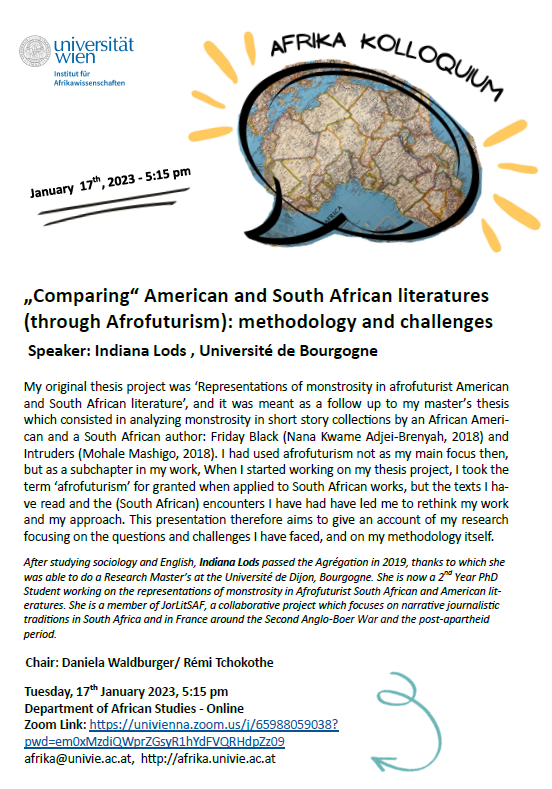
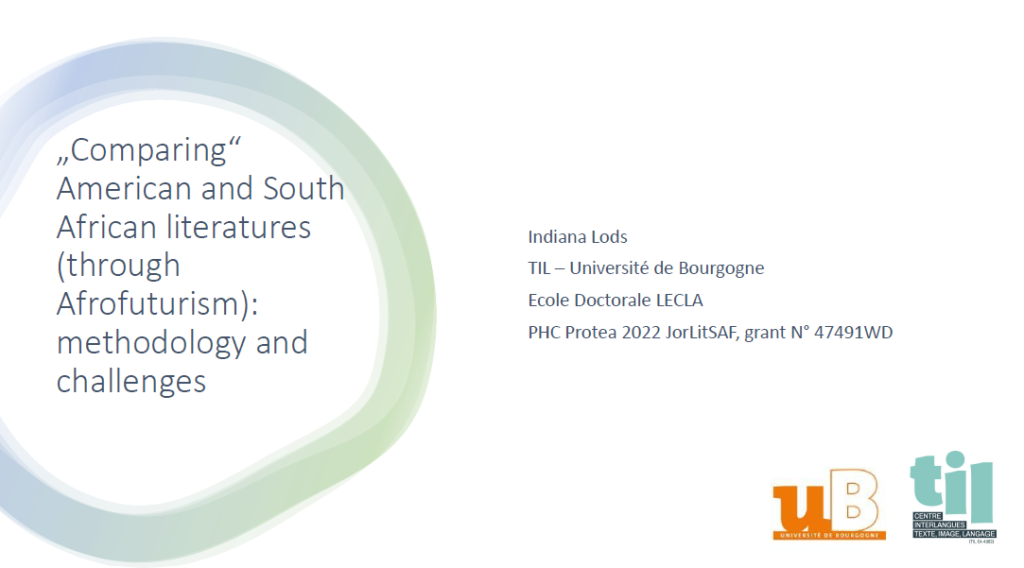
In February, South African PhD student Lesley Mofokeng found time during his summer holidays in the southern hemisphere to participate online in a graduate course offered by John Bak at the Centre Européen Universitaire in Nancy entitled "The Anglo-Boer War in the European Press." The course was part of the Graduate Centre's Masters 1 Etudes Européennes et Internationales program on Communications.
Protea JorLitSAF Online meeting
5 April 2023
In preparation of the two main events for May and for the return to Johanneburg in October 2023, the team met online for two hours to discuss past work, current efforts, and future plans as we approach the project deadline in December 2023.
Agenda
1. update to our current publications (where things stand with Gilles/Mélanie's collection; where things stand with articles for Lesley/John's Literary Journalism Studies volume, whose first drafts are due by May and final versions by next October; other publication updates)
2. news about IALJS in May 2023
3. news about our Ecole d'été in May/June 2023
4. news about our Joberg activities in October
5. any additional things to discuss
To read the meeting minutes, recorded by Indiana Lods, click here.
The next major events took place in May: IALJS 17 in Gdansk (Poland) and the Ecole d'été in Nancy (France).
Several members of the South African and one member of the French teams present their research on literary journalism and the Boer War at the 17th annual congress of the International Association for Literary Journalism Studies (IALJS). The congress was held at the University of Gdańsk from 18 to 20 May. The panel, on literary journalism and the Boer War, was a summary of the research conducted during the first year of JorLitSAF.
IALJS 17 (GDANSK), PANEL PROPOSAL
Type: Research
Title of Panel: “Literary Journalism and the Anglo–Boer War”
Description of Panel (150-250 words):
The Anglo–Boer War (1899–1902) was the first mediatized war on an international scale, and literary journalism figured strongly among its news stories, either to help promote Britain’s New Imperialism or to counter the many stories being (re)published around the world that were based almost exclusively on the War Office’s heavily-censored dispatches published in the British press or through its wire service, Reuters. From the imperial discourse of journalist–officer Winston Churchill to the narrative-driven nonfiction of Emily Hobhouse and Sol Plaatje, descriptive and engaging eyewitness accounts appeared in open “letters” to the press, in reports to the government, and in personal diaries, accurately capturing portions of the war’s jingoistic chauvinism, maligned vainglory, and racial and gender discriminations that were not always present in the columns of the world’s dailies. The work of these “accidental” literary journalists both engenders and counters the accepted narratives of literary journalism present in the fin de siècle’s “new” journalism and imperial discourse. The following panel will look at the war from competing and complementing global, local, and transnational perspectives: as a macro-journalistic event (Kevin Davie), as an alternative space for documenting black experiences (Lesley Mofokeng), and as a journalistic phenomenon that inaugurated various literary journalistic voices and styles (Lesley Cowling and John Bak).
Panel Moderator
John Bak, Université de Lorraine
Panelists w/individual topics:
“‘New’ Journalism, Technology and the Boer War”
Kevin Davie, Wits University (South Africa)
“The Invisibility of Black Experiences and Alternative Literary Spaces during the Boer War”
Lesely Mofokeng, Wits University (South Africa)
“Transnational Reach/Circulation of Emily Hobhouse: The South African Anglophone Presses”
Lesley Cowling, Wits University (South Africa)
“Transnational Reach/Circulation of Emily Hobhouse: The French Colonial and Dutch Presses”
John Bak, Université de Lorraine (France)
Panel Organizers/Contact:
Lesley Cowling,
Wits University (South Africa)
Lesley.Cowling@wits.ac.za
John Bak,
Université de Lorraine (France)
john.bak@univ-lorraine.fr
For a selection of the Powerpoint presentations delivered during the panel, click here.
The European Conference on African Studies “African Futures”
University of Cologne, Germany
Indiana Lods, PhD student
31 May-3 June 2022
JorLitSAF graduate student Indiana Lods presented the talk “Mapping futuristic South African literatures: the intersection between history, crime fiction and the future in Masande Ntshanga’s Triangulum (2019) and Imraan Coovadia’s A Spy in Time (2018)” on the panel “Bad Genre: ‘Counter Literature,’ Genetic Rewritings, and Imagining African Futures” at the conference “African Futures.”
30 May–3 June 2023
The entire JorLitSAF team was joined by European scholars of colonial British writing, the Dutch press, and German literary journalism to hold the 3rd Transnational Literary Journalism Summer School at the Université de Lorraine.
“Literary Journalism and South Africa from the Anglo–Boer War
to Post-Apartheid: The Cases of France, Germany, the Netherlands, and England”30 May–3 June 2023
The third Summer School of the ReportAGES research project, a five-day graduate course for Master’s and PhD students, as well as interested academics, explored how historical trends in narrative literary journalism in France, Germany, England and the Netherlands from the Anglo-Boer War to post-apartheid reshaped the media landscape of each country, distinguishing a European development of the genre not just from its Anglo-American cousins but also from each other.
Following morning and afternoon workshops and lectures on eight principal themes treated in literary journalism and South Africa (e.g., the Anglo-Boer War, documentary aesthetics, concentration camps, colonialism, the popular press, apartheid, Afro-futurism, etc), students and faculty members were introduced to the historical and cultural motivations behind the current popularity of literary journalism in South Africa, France, and other nations.
Thanks to the Lorraine-Bonn Erasmus+ Blended Mobility exchange, four graduate students from the Universität Bonn attended the Summer School, including one who had attended last year’s School on Franco-German literary journalism from the First World War. The eight modules covered various topics for the students, who were always eager to participate and offer up their personal observations or thoughts.
Andrew Griffiths (Open University, UK) began the School with a course on Literary Journalism and Empire in the British Press, 1899–1901, which perfectly set the stage for Lesley Cowling’s (Wits University, SA) course on Non-Conformist Women’s Writing in Southern Africa – from 1880s to 1980s and John Bak (IDEA) and Sara Izzo’s (Bonn, Germany) module on Transnational Literary War Journalism and the Boer War: Perspectives from the French Colonial and German Presses.
Gilles Teulié (Aix-Marseille) continued the discussion of the Boer War on Days 2 and 3 with his course on Literary Journalism & Microhistory, followed by Lesley Mofokeng’s (Wits University, SA) module on Sol Plaatje, a Self-made Diarist and Newspaper Editor. Kevin Davie (Wits University, SA) finished the day with a panorama of literary journalism just prior to the Boer War.
Day 3 included courses by Frank Harbers (University of Groningen, Netherlands) on the Coverage of the Second Boer War in the Dutch Mass Press, and Days 4 and 5 found Mfuneko Toyana (Wits University, SA) and Indiana Lods (Université de Bourgogne) bringing the Summer School to contemporary times with their course on Generic Blurring in Contemporary South African Literary Journalism.
The Summer School was sponsored by PHC Protea 2022 (grant N° 47491WD), the National Research Foundation in South Africa, Lorraine Université d’Excellence (LUE) and its grant program RÉCOLTE, the Lorraine research center IDEA (UR 2338), Wits University and the Humanities Faculty (ALL) of the Université de Lorraine.
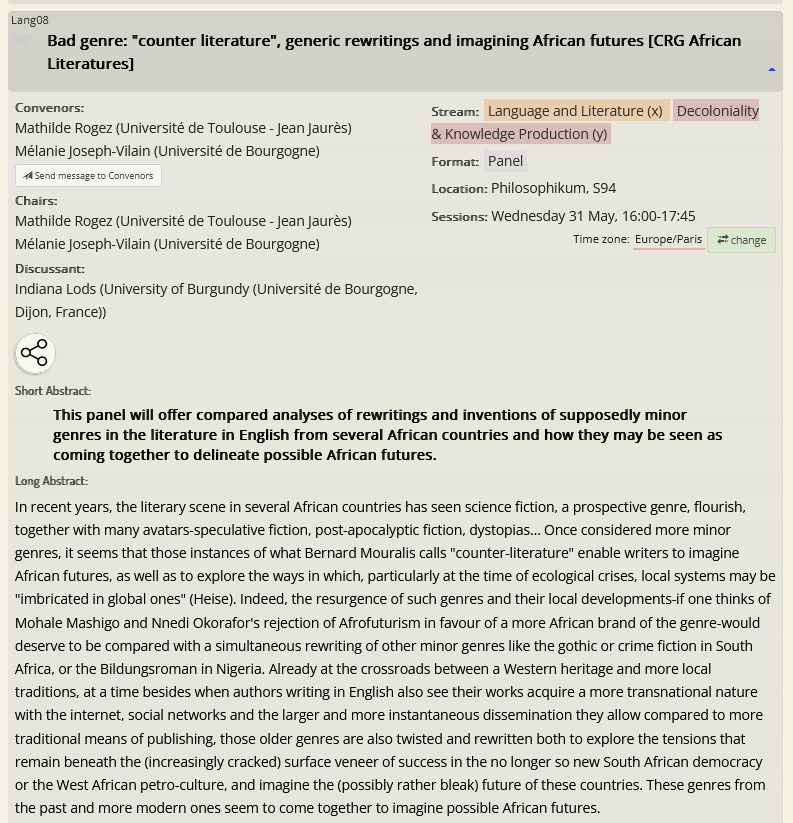
-
On Friday afternoon of 13 October 2023, Gilles Teulié gave the following talk, entitled « En attendant les barbares : la carte postale coloniale dans tous ses états », during a seminar of the Groupe de Recherche sur l’Eugénisme et le Racisme, Université Paris Cité, UFR EILA | GRER-ICT (UR 337). His research for the talk developed in part from his work with JorLitSAF colleagues during the past two years of their joint PROTEA project, whose financial participation he acknowledged at the start of the presentation.
On 19 October 2023, Lesley Mofokeng was a guest speaker at a book launch in Melville (Johannesburg) South Africa. He and Kevin Davie both contributed chapters in this collection, edited by Sabata-mpho Mokae and Brian Willan and published by Jacana Media.
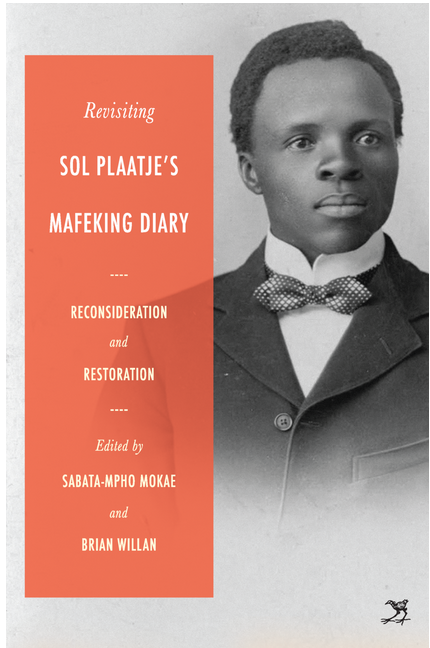
Announcement for the tour: https://www.spu.ac.za/index.php/invitation-to-a-literary-celebration-revisiting-sol-plaatjes-mafeking-diary/
-
-
Program 2025
-
The JorLitSAF project really never came to end, despite the conclusion of its funding in December 2023. Gilles Teulié (Aix-Marseille) and Mélanie Joseph-Vilain (Université de Bourgogne) recently published their special issue of the journal Postcolonial Literatures and Arts (vol. 2, no. 2) “Reassessing Generic Boundaries in South African Literatures” https://doi.org/10.4000/1422a) in which articles appeared from two of JorLitSAF’s graduate students: Indiana Lods (PhD, Université de Bourgogne) with “‘Historical fiction is back’: (Non)Fictional Pasts and Presents in Fred Khumalo’s metahistorical romance, The Longest March“ and Mfuneko Toyana (Wits University) with “The Invention of a New Language: The Chimurenga Chronic’s Literary Journalism as an Act of Radical Knowledge-Making.” Both articles were workshopped in Nancy and later in Johannesburg, during official visis of the South African consortium to France in June 2022 and French colleagues to South Africa in October 2022. Indiana Lods also contributed an interview she had conducted with South African novelist Fred Khumalo during her extended stay in Joberg financed by the Protea grant.
More recently, Gilles Teulié traveled to Cape Town in June 2025 to participate in a panel with Lesley Cowling and Lesley Mofokeng that drew upon research begun in the JorLitSAF project. The conference, “Decentering Media Histories and Practices,” was held at the University of Cape Town and sponsored by the International Association for Media and History (IAMHIST). The panel was entitled “Mapping coverage of the Anglo-Boer War across French and South African presses.” In addition, new colleagues from other French universities who presented at the conference joined the initial JorLitSAF team to expand it into a wider project. Finally, in 2025, John S. Bak was officially made Research Associate of the School of Literature, Language and Media at Wits, a position he will hold for three years.
Moreover, the JorLitSAF research project is seeing its pedagogical commitments coming to fruition. Lesley Mofokeng just submitted his PhD thesis, entitled “Sol T. Plaatje’s Ink: Exploring the Nascent Setswana Public Sphere through the Form of Plaatje’s Newspapers (1901–1915),” and it will be examined before November 2025. And Indiana Lods has one more year to complete her PhD, entitled « Les représentations de la monstruosité dans les littératures afrofuturistes sud-africaine et états-unienne ». Both PhD thesis benefitted from workshopping and individual conseilling during the students’ extended research stays in France and in South Africa, respectively.
Gilles is currently laying down the foundations for a CIVIS project between Wits, Aix and Libre Bruxelles universities, all eligible partners for a CIVIS project.
In July, several members gathered in Cape Town, South Africa, to participate in a panel on "Mapping coverage of the Anglo-Boer War across French and South African presses” at the International Association for Media and History Conference on Decentering Media Histories and Practices.
In mid-November 2025, several of the JorLITSAF team will meet in Aix for a three-day writing workshop at the Université d’Aix-Marseille to present and revise in group discussions research articles (sent to everyone in advance) for a new collected volume on the representions of France and South Africa in each others’ print cultures. JorLitSAF is expanding its original research consortium and scientific parameters beyond literary journalism to look at various representations of South Africa and its people in France, and France and the French in South Africa.
This expansion of the original project, now entitled “Tracing the Historical Intersections of South Africa and Europe through Narrative,” produced a formal CIVIS application last February, with a response from CIVIS anticipated in early November. While Phase Two of this new project was held in Cape Town this past June and July following the IAMHIST conference and included discussion sessions on our research work-in-progress, Phase Three is planned for November 2025, when the JorLitSAF team and its several new members, including representatives from CIVIS universities, will gather in Aix to workshop articles that will be collected into a new book on representations of – and links between – France and South Africa in both countries’ culture and imagination.
There was some good news as well in September. John was able to secure an additional grant for the project, this time from the French embassy in Pretoria. The grant of 2,860 euros will be used to help defray the costs of members from South Africa to attend the JorLitSAF workshop to be held in Aix, France, during the second week of November 2025.
For December, John was also invited to Vrije Universiteit Brussel to deliver a keynote address during the CLIC research center's symposium on Literary and Journalism. His talk is entitled “H. Rider Haggard, Jean Carrère, and Literary Journalistic Representations of the Boers in the French Press during the Anglo-Boer War, 1899–1902?”
Also in December, John and Lesley will have published their special issue of Literary Journalism Studies, entitled "Spotlight on South African Literary Journalism". All of the JorLitSAF members have contributed articles, reviews, or interview.
